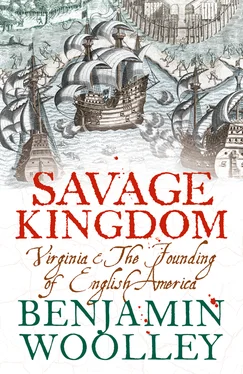The journey from St Augustine to Fort Caroline had proved dangerous and tiring. Though led by Francis Jean, a French defector who had lived in Fort Caroline, Menéndez’s troops got lost. They had to make their way through ‘morasses and desert paths never yet trod’, often up to their armpits in water, holding heavy knapsacks, ladders (for scaling the fort’s palisade) and harquebuses (a heavy forerunner to the musket) above their heads. They had finally reached a ‘little rise in the ground’ overlooking Fort Caroline in the early morning of 20 September, ‘the eve of the day of the Blessed Apostle and Evangelist St Matthew’. 5
Menéndez commanded his men to stay hidden in the woodland while the camp master, Don Pedro de Valdes, and Francis Jean were sent ahead. They made their way through the thick undergrowth until they found their path blocked by a fallen tree. Turning back, a French sentinel who was patrolling nearby glimpsed them through the thicket. ‘ Qui va la? [Who goes there?]’ he called. ‘Un Français [a Frenchman],’ the Spanish captain replied, in a convincing accent. The sentinel approached, and as soon as he was within reach, Valdes drew his sword and slashed him across the face. The sentinel fell backwards, giving a shout.
The cry carried through the thicket of trees, across the waterlogged clearing and turf embankment surrounding the French fort, through the wide gaps of its palisade, reaching the ears of Challeux as he was leaving his quarters. Guards were summoned, and they rushed out to see what had happened, leaving the fort’s gates open behind them.
At the same moment, Menéndez, thinking the cry was from his own camp master, gave the order to attack. Spanish troops burst from the cover of trees and poured through the fort’s still-open gates, firing and slashing at the panicking French settlers, who emerged from their quarters in their nightshirts to see what was going on.
Challeux saw a Spanish pikeman charging at him, and ran to a ladder or scaffold leaning up against one section of the fort’s rampart. ‘Nothing but the grace of God enabled me to double my effort,’ he recalled. ‘Old grey-haired man that I am, I nevertheless jumped over the ramparts, which if I thought about it, I could not have done, for they were eight or nine feet in height.’ 6
Not until he reached the cover of trees did he dare look back. He beheld ‘the horrible slaughter of our people’. Some managed to reach boats moored along the nearby shore, and row out to Ribault’s fleet, which was anchored in the river. The rest were killed where they stood, the Spanish vying ‘with each other as to who could best cut the throats of our men’. They even attacked the ill, the old, women and children, Challeux claimed, ‘in such a way that it is impossible to conceive of a massacre which could be equal to this one in cruelty and barbarity’. 7
Once the savagery had subsided, the corpses were dragged out of the fort and dumped on the river bank. The Spanish soldiers, frustrated that so many had escaped, ‘vented their wrath and bloody cruelty on the dead’, scooping out their victims’ eyeballs, sticking them on the points of their daggers, and hurling them into the river ‘with shrieks of abuse and ribald laughter’.
Challeux fled into the woods, and made his way to the coast. He was picked up by one of Ribault’s ships the next day, and reached France a few weeks later, where he published a sensational account of his experiences. Others, including Jean Ribault, were less fortunate. Caught in a storm, they were shipwrecked back on the Florida coast. Exhausted and starving, they eventually surrendered to the Spanish, who bound them two by two, took them behind a sand dune, and slaughtered them. Only seven were spared, four who claimed to be Catholics, together with a drummer, a fife player and a carpenter, required by Menéndez to supplement his own troops. 8
In a report of his actions sent to King Philip, Menéndez boasted, ‘I made war with fire and blood as Governor and Captain General of these Provinces upon all who might have come here to settle and to plant this evil Lutheran sect’. Having ‘come to this coast to burn and hang’ the hated Huguenots, he pledged to continue pursuing them ‘by sea and by land’ until they were annihilated.
To prevent any other adherents of that ‘wicked Lutheran sect’ returning to North America – particularly the English, who he noted had nominated Ribault ‘Captain General of all [their] fleet’ – Menéndez now urged the King to secure the entire eastern coast of North America. In particular, the Spanish should build a fort at the ‘Bahia de Santa Maria’ at thirty-seven degrees of northerly latitude, ‘the key to all the fortifications in this land’. This was the region that would later come to be dubbed by the English ‘Virginia’. 9
Even in Spain, Menéndez was denounced for ‘inhumanely condemning so many souls to hell for ever’ at Fort Caroline. But he claimed that such brutality had been necessary. He had prevented the weed of Protestantism which had spread so quickly across the northern parts of Europe, from taking hold in the fertile soil of the New World. The massacre was a godly act, born of ‘divine inspiration, rather than from any dictate of human understanding’. Some even suggested that Menéndez had been merciful, ‘since he nobly and honourably put them to the sword, when by every right he could have burnt them alive’, the preferred punishment for heresy.
King Philip, who saw himself and his mighty empire as custodians of the true faith, reinforced this view. ‘The justice you meted out to the Lutheran corsairs who attempted to occupy and fortify Florida in order to sow the seeds of their wicked sect,’ he informed Menéndez, was ‘fully justified’. In the great battle for the soul of Europe and the future of mankind, North America had become the new front line. 10
ON A COLD JANUARY DAY IN 1606, a messenger walked inconspicuously across the cobbles of London’s Strand, carrying a parcel for delivery to an address opposite the Savoy. It was a journey of only a few hundred yards, but one that crossed from one era of history to another. Just beyond Charing Cross lay York House, where, in 1599, the Earl of Essex, ‘a man of great designs’, had been imprisoned for his attempts to rouse Queen Elizabeth’s hesitant government to a heroic war against the ‘tyranny’ of Catholic Spain. A few yards further on was Durham House, once the home of Sir Walter Raleigh, the swashbuckling adventurer who had tried, and failed, to make North America an English colony, and a beachhead for attacking the Spanish empire. Essex had been executed for his rebellious behaviour in 1601. Raleigh was arrested for treason two years later, and now languished in the Tower of London, his bold schemes mere echoes in the empty halls of his great residence.
Past these mausoleums to old follies and glories lay the messenger’s destination, a brand-new, flat-fronted, perpendicular brick building. At each corner stood a tower, soaring as high as the famous lantern or ‘little turret’ atop Durham House, from which Raleigh had once beheld a ‘prospect which is pleasant perhaps as any in the World’. 1 This building was the London residence of Robert Cecil, the Earl of Salisbury, the man who had contrived the downfall of these political giants, shaped the emergence of a new regime under a new king, and cemented his astonishing rise by commissioning the turreted edifice soaring overhead.
The messenger knocked on the door, and was admitted to a small antechamber. Being Secretary of State to King James, and the monarch’s most trusted servant, the Earl was daily assailed by crowds of applicants, supplicants, petitioners and messengers competing for his much divided attention, and the antechamber had been especially set aside to receive them.
Читать дальше












